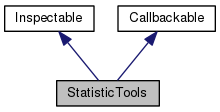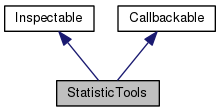|
| | StatisticTools (const std::string &name="StatisticTools") |
| |
| virtual double & | addMeasure (double &observedValue, const char *measureName, MeasureMode mode, long stepSpan, double additionalParam=0) |
| | adds a variable to observe and measure the value More...
|
| |
| virtual StatisticMeasure * | getMeasure (double &observedValue, const char *measureName, MeasureMode mode, long stepSpan, double additionalParam=0) |
| | Same as the method above, but instead of getting the calculated value back (the adress), you get the StatisticMeasure itself. More...
|
| |
| virtual AbstractMeasure * | getMeasure (const std::string &measureName) const |
| | returns a measure that is already in the pool (or 0 if not found) More...
|
| |
| virtual double & | addMeasure (AbstractMeasure *measure) |
| | You can add another abstract measure you like. More...
|
| |
| virtual double & | addMeasureList (std::list< AbstractMeasure * > measureList) |
| | You can add another abstract measure you like. More...
|
| |
| virtual double & | addMeasureList (std::list< ComplexMeasure * > measureList) |
| | You can add another abstract measure you like. More...
|
| |
| virtual double & | addMeasureList (std::list< StatisticMeasure * > measureList) |
| | You can add another abstract measure you like. More...
|
| |
| virtual void | beginMeasureAt (long step) |
| | starts the measure at a specific time. More...
|
| |
| virtual bool | measureStarted () |
| | Tells you wether the measures have already been started. More...
|
| |
| virtual void | doOnCallBack (BackCaller *source, BackCaller::CallbackableType type=BackCaller::DEFAULT_CALLBACKABLE_TYPE) |
| | CALLBACKABLE INTERFACE. More...
|
| |
| | Inspectable (const iparamkey &name="") |
| | TYPEDEFS END. More...
|
| |
| virtual | ~Inspectable () |
| |
| virtual iparamkeylist | getInternalParamNames () const |
| | The list of the names of all internal parameters given by getInternalParams(). More...
|
| |
| virtual iparamvallist | getInternalParams () const |
| |
| virtual iparamvalptrlist | getInternalParamsPtr () const |
| | be careful: matrices will be ignored More...
|
| |
| virtual ilayerlist | getStructuralLayers () const |
| | Specifies which parameter vector forms a structural layer (in terms of a neural network) The ordering is important. More...
|
| |
| virtual iconnectionlist | getStructuralConnections () const |
| | Specifies which parameter matrix forms a connection between layers (in terms of a neural network) The orderning is not important. More...
|
| |
| virtual void | addInspectableValue (const iparamkey &key, iparamval const *val, const std::string &descr=std::string()) |
| | This is the new style for adding inspectable values. More...
|
| |
| virtual void | addInspectableMatrix (const iparamkey &key, const matrix::Matrix *m, bool only4x4AndDiag=true, const std::string &descr=std::string()) |
| | This is the new style for adding inspectable values. More...
|
| |
| virtual void | addInspectableDescription (const iparamkey &key, const std::string &descr) |
| | adds a description for the given parameter using info-lines The line will start (appart from the #I) with a D for description followed by the key end then followed by the string. More...
|
| |
| virtual void | addInfoLine (std::string infoLine) |
| | Adds an info line to this inspectable instance. More...
|
| |
| virtual void | addInfoLines (std::list< std::string > infoLineList) |
| | Adds a bunch of infolines with addInfoLine to this inspectable instance. More...
|
| |
| virtual void | removeInfoLines () |
| | Removes all infolines from this inspectable instance. More...
|
| |
| virtual const infoLinesList & | getInfoLines () const |
| | Returns all infolines added to this inspectable instance. More...
|
| |
| virtual void | addInspectable (Inspectable *insp) |
| | Adds an inspectable as a child object. More...
|
| |
| virtual void | removeInspectable (Inspectable *insp) |
| | Removes an inspectable as a child object. More...
|
| |
| virtual void | setNameOfInspectable (const iparamkey &name) |
| | set the name of the inspectable More...
|
| |
| virtual const iparamkey | getNameOfInspectable () const |
| | return the name of the inspectable, getName() would conflict with Configurable::getName() too often More...
|
| |
| virtual const inspectableList & | getInspectables () const |
| | Returns the list containing all inspectable children. More...
|
| |
| | Callbackable () |
| |
| virtual | ~Callbackable () |
| |
TODO: add possibility to pass description of a measure.


 Public Member Functions inherited from Inspectable
Public Member Functions inherited from Inspectable Public Member Functions inherited from Callbackable
Public Member Functions inherited from Callbackable Protected Attributes inherited from Inspectable
Protected Attributes inherited from Inspectable Public Types inherited from Inspectable
Public Types inherited from Inspectable